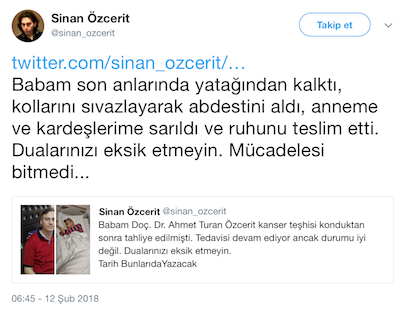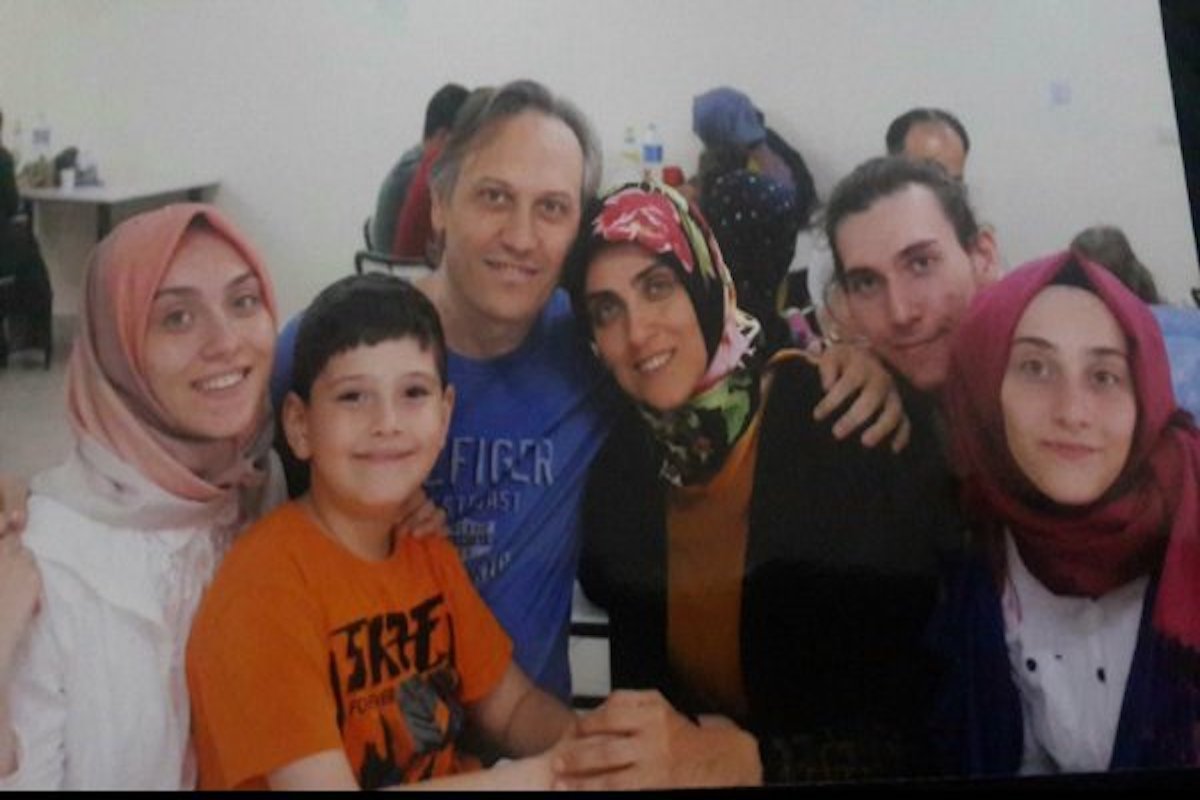Ass. Profesor Ahmet Turan Özcerit, who used to work at Sakarya University’s Faculty of Computer and Information Science until he was first arrested and jailed and then dismissed from his duty at the university over his alleged links to the Gülen movement, has lost his life on Monday. He has been diagnosed with cancer in his liver and intestines during his stay in the prison.

Özcerit was arrested as part of a Sakarya-based investigation into the movement on August 8, 2016 and a post-coup emergency decree No 672 sacked him from the university on September 1, 2016. The indictment against Özcerit was prepared only 13 months after his jailing and Özcerit has developed serious medical problems since then.

It had been reported that Özcerit’s could be a terminal cancer as was the case in jailed judge, Mustafa Erdoğan’s infection that left him died immediately after his release from prison. Judge Erdoğan, who was member of the Turkish Court of Cassation, also jailed over his alleged links to the Gülen movement, died in critical care after being released from prison in late August this year. Judge Erdoğan was denied right to trial without arrest despite his illness. His family members were also not allowed to accompany him until he was released before he died.
Özcerit’s children as well as his wife were also denied request to see him in prison. “My father has been diagnosed with liver cancer and needs immediate treatment. He is now being kept at the detention ward of İzmir Training and Research Hospital. Neither my mother nor anyone else is allowed to keep him company. All I want is to see him free and healthy,” Sinan Özcerit had told TR724 news portal on September 9, 2017.

“He has a tumor in his liver. He can’t eat. He loses weight. He also has ulcer and gallbladder stone. We got a medical report and demanded his release from the Sakarya 5th High Criminal Court. The judge looked at the report and asked for a committee report. We went back to the doctor and asked for that committee report and he told us he could give it only after the surgery. When we ask when would the surgery happen, we were not given any specific date. Both the doctor and the judge are scared. At the prison, we were allowed to see our father every two week. However, here at the hospital, we are not allowed to see him at all,” Sinan Özcerit had said.
Sinan Özcerit has earlier told the online news outlet Kronos that “They turned our home upside down. They seized some children’s books. They also seized a copy of the Count of Monte Cristo as evidence during a raid at our neighbor. They took away my father and we failed to hear from him for 3 days. Authorities have never answered our inquiries. We ultimately located him after 3 days and took some clean underwear to him. He said the detention conditions are awful. They let him only to stay in underclothes with his hands cuffed. When they [detainees] asked for water, they replied: ‘You don’t even deserve to drink water.’ They beat my father and tortured him. We got doctor report for that. He was forced to stay with 20 other people in a 4-people cell. They slept in turns as there was no enough space for everyone to sleep at the same time. When he was transferred from police custody to prison, he said it was like a paradise to stay in prison comparing to the previous place.”
Stockholm Center for Freedom (SCF) has reported in one of its studies titled “Suspicous Deaths and Suicides In Turkey” that there has been an increase in the number of suspicious deaths in Turkey, most in Turkish jails and detention centers where a torture and ill-treatment is being practiced. In most cases, authorities concluded these as suicides without any effective, independent investigation.
The suspicious death has also taken place beyond the prison walls amid psychological pressure and threats of imminent imprisonment and torture, sometimes following the release of suspects or just before the detention. SCF has compiled 105 cases of suspicious death and suicides in Turkey in a list in a searchable database format.
Turkey survived a controversial military coup attempt on July 15, 2016 that killed 249 people. Immediately after the putsch, the Justice and Development Party (AKP) government along with Turkish autocratic President Recep Tayyip Erdoğan pinned the blame on the Gülen movement.
Gülen, who inspired the movement, strongly denied having any role in the failed coup and called for an international investigation into it, but President Erdoğan — calling the coup attempt “a gift from God” — and the government initiated a widespread purge aimed at cleansing sympathizers of the movement from within state institutions, dehumanizing its popular figures and putting them in custody.
Turkey has suspended or dismissed more than 150,000 judges, teachers, police and civil servants since July 15. Turkey’s Interior Minister announced on December 12, 2017 that 55,665 people have been arrested. Previously, on December 13, 2017, The Justice Ministry announced that 169,013 people have been the subject of legal proceedings on coup charges since the failed coup.
A total of 48,305 people were arrested by courts across Turkey in 2017 over their alleged links to the Gülen movement, said Turkish Interior Minister Süleyman Soylu on Dec. 2, 2018. “The number of detentions is nearly three times higher,” Soylu told a security meeting in İstanbul and claimed that “Even these figures are not enough to reveal the severity of the issue.”















